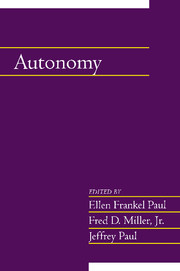Book contents
- Frontmatter
- Contents
- Introduction
- Acknowledgments
- Contributors
- Stoic Autonomy
- Autonomous Autonomy: Spinoza on Autonomy, Perfectionism, and Politics
- Kant on the Theory and Practice of Autonomy
- How Much Should We Value Autonomy?
- Autonomy, Duress, and Coercion
- Autonomy and Hierarchy
- Reason and Autonomy
- Identification, the Self, and Autonomy
- Some Tensions between Autonomy and Self-Governance
- Autonomy from the Viewpoint of Teleological Behaviorism
- The Paradox of Group Autonomy
- Abortion, Autonomy, and Control over One's Body
- Freedom as a Political Ideal
- Index
The Paradox of Group Autonomy
Published online by Cambridge University Press: 06 July 2010
- Frontmatter
- Contents
- Introduction
- Acknowledgments
- Contributors
- Stoic Autonomy
- Autonomous Autonomy: Spinoza on Autonomy, Perfectionism, and Politics
- Kant on the Theory and Practice of Autonomy
- How Much Should We Value Autonomy?
- Autonomy, Duress, and Coercion
- Autonomy and Hierarchy
- Reason and Autonomy
- Identification, the Self, and Autonomy
- Some Tensions between Autonomy and Self-Governance
- Autonomy from the Viewpoint of Teleological Behaviorism
- The Paradox of Group Autonomy
- Abortion, Autonomy, and Control over One's Body
- Freedom as a Political Ideal
- Index
Summary
INTRODUCTION
This essay explores the prospects of developing a satisfying account of group autonomy without rejecting value-individualism. That is, I will examine whether one can adequately explain the moral reasons to respect a group's claim to self-determination while insisting that only individual persons are of ultimate moral value.
I divide this essay into three main sections. First, I explain my understanding of the value of individual autonomy and the implications this has for group autonomy. Next, I review three possible accounts of group autonomy, featuring value-collectivism, individual autonomy, and individual well-being. In the end I find none of these approaches to be fully adequate; thus, I conclude the third and final section by introducing what I label the “Paradox of Group Autonomy.”
THE VALUE OF AUTONOMY
There is widespread agreement that individuals enjoy a privileged position of moral dominion over their self-regarding affairs. It is not always clear when any given action is purely self-regarding, of course, but many people believe that we should be allowed to choose freely when our behavior is not harmful to others. One justification given for this view of individual self-determination is that it fosters overall well-being. This justification rests upon three plausible observations: each person is likely to be (1) the most knowledgeable about, (2) the most interested in, and (3) the best positioned to promote her own welfare. In light of these three considerations, it seems reasonable to conclude that, in the absence of extenuating circumstances, each agent is likely to fare best when she is given authority over her self-regarding affairs.
- Type
- Chapter
- Information
- Autonomy , pp. 265 - 285Publisher: Cambridge University PressPrint publication year: 2003



